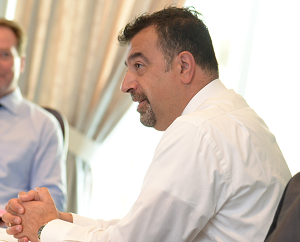Editor's note: This week's three-part coverage of Morningstar's Canadian equity roundtable concludes today with the portfolio managers discussing select holdings in the financial, consumer and industrial sectors.
Our panellists:
Ryan Fitzgerald, senior portfolio manager and senior vice-president at Harbour Advisors, a separate portfolio-management group under the C.I. Investments Inc. umbrella. A value manager, Fitzgerald's responsibilities include CI Harbour, CI Harbour Corporate Class, CI Harbour Global Equity Corporate Class and CI Harbour Voyageur Corporate Class.
Michael O'Brien, managing director and head of the core Canadian equity team at TD Asset Management Inc. His mandates include that of lead manager of TD Canadian Equity and TD Balanced Income. O'Brien's investment style is GARP, growth at a reasonable price.
Hovig Moushian, senior vice-president, portfolio manager and head of the all-cap value team at Mackenzie Investments. His responsibilities include Mackenzie Canadian All Cap Dividend and Mackenzie Canadian All Cap Value.
The roundtable, which began on Monday and continued on Wednesday, was convened and led by Morningstar contributor Sonita Horvitch.
Q: Can we discuss your holdings in the Canadian financial-services sector?
O'Brien: This is the biggest sector overweight in TD Canadian Equity. The portfolio has significant weightings in ![]() Royal Bank of Canada (RY),
Royal Bank of Canada (RY), ![]() Toronto-Dominion Bank (TD) and
Toronto-Dominion Bank (TD) and ![]() Bank of Nova Scotia (BNS). These banks have increased their dividends decade after decade. In the middle part of this year, we built up our positions in
Bank of Nova Scotia (BNS). These banks have increased their dividends decade after decade. In the middle part of this year, we built up our positions in ![]() Manulife Financial Corp. (MFC) and
Manulife Financial Corp. (MFC) and ![]() Sun Life Financial Inc. (SLF). Among the non-bank financials, the portfolio has a significant holding in Brookfield Asset Management Inc. (BAM.A). It is a unique investment opportunity in Canada. It has a good track record and a strong management team with a clear vision for the company.
Sun Life Financial Inc. (SLF). Among the non-bank financials, the portfolio has a significant holding in Brookfield Asset Management Inc. (BAM.A). It is a unique investment opportunity in Canada. It has a good track record and a strong management team with a clear vision for the company.
| Bank of Nova Scotia | Royal Bank of Canada | Toronto-Dominion Bank | |
 |
|||
| Oct. 11 close | $80.83 | $98.83 | $71.11 |
 |
|||
| 52-week high/low | $82.30-$69.15 | $99.90-$81.57 | $71.85-$57.42 |
 |
|||
| Market cap | $96.2 billion | $143.8 billion | $131.3 billion |
 |
|||
| Total % return 1Y* | 18.9 | 24.6 | 26.8 |
 |
|||
| Total % return 3Y* | 9.3 | 10.9 | 13.4 |
 |
|||
| Total % return 5Y* | 11.9 | 14.9 | 14.9 |
 |
|||
 |
|||
| *As of Oct. 11, 2017 Source: Morningstar |
|||
Moushian: We own Brookfield Asset Management. It has been a phenomenal long-term creator of value. The company invests in areas that are out of favour at the time but that realize value over the long term.
Fitzgerald: Brookfield Asset Management is in Harbour Fund. The company focuses on assets such as real estate, infrastructure assets and renewable energy. It also has a private-equity component. The demand for hard or real assets by institutional investors is a long-term theme and a long-term growth driver for Brookfield Asset Management. It is one of the few providers of exposure to these assets. Then, through the company's financial structure and fee structure, it has something of a leveraged play to the flow of funds to these assets.
 |
|
 |
|
| Michael O'Brien | |
 |
|
 |
|
 |
O'Brien: Over the long term, these real or hard assets are going to generate the kind of cash flows that pension and endowment funds are going to need to meet their obligations 10, 20, 30 years from now.
Fitzgerald: Harbour Fund has three banks -- Royal, TD and Scotiabank -- which collectively represent 13% of the portfolio. We have one insurance company, Sun Life Financial, which has become a little controversial given the hiccups with its asset-management business. We think that this is going to turn around and be a decent driver of the stock going forward.
Moushian: Our exposure to the banks is concentrated in TD and, more recently, in ![]() Canadian Imperial Bank of Commerce (CM). Manulife Financial is our biggest holding in the insurers. It has good growth prospects in Asia. Manulife has been an erratic reporter. We have seen a couple of quarters where the numbers are more stable and the results are looking good. It has been a riskier name that we have benefitted from.
Canadian Imperial Bank of Commerce (CM). Manulife Financial is our biggest holding in the insurers. It has good growth prospects in Asia. Manulife has been an erratic reporter. We have seen a couple of quarters where the numbers are more stable and the results are looking good. It has been a riskier name that we have benefitted from.
Q: Canadian consumer staples and consumer-discretionary stocks?
Fitzgerald: There is not much to choose from in these two TSX sectors. These companies almost have permanent spots in Canadian retail and institutional portfolios. This worries me, given the prospects of technology disruption by the likes of ![]() Amazon.com Inc. (AMZN) and the challenges from new entrants. If you look at the valuations of the Canadian grocers versus those grocers elsewhere that have already suffered from some of these headwinds, there is downside risk to the Canadian stocks. We do not own any Canadian consumer staples in Harbour Fund. Among the Canadian consumer-discretionary stocks, Dollarama Inc. (DOL) is one of the most loved stocks in Canada. It trades around 30 times earnings. Clearly investors do not see a risk that this retailer can be disrupted in any way. I am skeptical.
Amazon.com Inc. (AMZN) and the challenges from new entrants. If you look at the valuations of the Canadian grocers versus those grocers elsewhere that have already suffered from some of these headwinds, there is downside risk to the Canadian stocks. We do not own any Canadian consumer staples in Harbour Fund. Among the Canadian consumer-discretionary stocks, Dollarama Inc. (DOL) is one of the most loved stocks in Canada. It trades around 30 times earnings. Clearly investors do not see a risk that this retailer can be disrupted in any way. I am skeptical.
O'Brien: I am not as negative on the Canadian grocers. The valuations have come down from where they were and look more reasonable. In the consumer-discretionary sector, Dollarama has done exceptionally well for a long time. I am less concerned about the impact of online retailing on the dollar stores. Nevertheless, when a stock is trading at these rarified valuations, you have to ensure that the fundamentals are supportive. The stock has been a wonderful long-term holding in the portfolio, but I am a little cautious.
 |
|
 |
|
| Ryan Fitzgerald | |
 |
|
 |
|
 |
The other Canadian name that we have in the discretionary sector and one that has also done well for us is ![]() Quebecor Inc. (QBR.B), a cable and media company. The stock has a dividend yield of about 0.05%, which is far lower than the yield on the traditional Canadian telecommunication-services stocks. Quebecor is building a strong wireless presence in Quebec.
Quebecor Inc. (QBR.B), a cable and media company. The stock has a dividend yield of about 0.05%, which is far lower than the yield on the traditional Canadian telecommunication-services stocks. Quebecor is building a strong wireless presence in Quebec.
TD Canadian Equity has two Canadian consumer-staple names. They are ![]() Alimentation Couche-Tard Inc. (ATD.B), a convenience-store operator, and
Alimentation Couche-Tard Inc. (ATD.B), a convenience-store operator, and ![]() Loblaw Companies Ltd (L), a major Canadian grocer. Early in the year, we had a holding in the dairy company
Loblaw Companies Ltd (L), a major Canadian grocer. Early in the year, we had a holding in the dairy company ![]() Saputo Inc. (SAP). We eliminated that simply on valuation.
Saputo Inc. (SAP). We eliminated that simply on valuation.
Moushian: Couche-Tard is a more recent addition to the portfolio. The valuation is reasonable. Couche-Tard has demonstrated its ability to lever its balance sheet to make acquisitions and then rapidly pay down that debt. It is a high-cash-flow-generating business. I also own Loblaw.
Q: On industrials, can we concentrate on the Canadian rail stocks?
Moushian: I own ![]() Canadian Pacific Railway Ltd (CP). I built the position up dramatically in the summer. I do not own
Canadian Pacific Railway Ltd (CP). I built the position up dramatically in the summer. I do not own ![]() Canadian National Railway Co (CNR). CP will benefit from the improvement in the commodity cycle, the potential for the resumption in the transport of crude oil by rail and the generally positive levels of activity in the rails. The valuations of the rail stocks are somewhat elevated.
Canadian National Railway Co (CNR). CP will benefit from the improvement in the commodity cycle, the potential for the resumption in the transport of crude oil by rail and the generally positive levels of activity in the rails. The valuations of the rail stocks are somewhat elevated.
O'Brien: The rails are some of the better businesses in Canada. CN is the bluest of the blue chips. That has always been a core position. But its virtues do not go unnoticed and it tends to get quite expensive at times. I share Hovig's views on CP. We had not owned it for a long time. Within the last 12 months, we built up a meaningful position in it. I see better valuation opportunity in CP than in CN. But CN remains our core holding.
Fitzgerald: We own both CP and CN, with a heavier weighting in CN. At these valuations, they do not get me too excited.
 |
|
 |
|
| Hovig Moushian | |
 |
|
 |
|
 |
Q: Can we summarize our discussion at this roundtable?
O'Brien: It has been a slow start to the year for Canadian equities. I am more optimistic now that Canada will start to catch up to the strong performance by some of the leading equity markets around the world. The key to that is a better performance from the Canadian banks and the energy sector.
Moushian: We remain concerned about the length of this bull market and the overall valuations. We are finding good value in the energy sector, which we think will drive the Canadian equity market in the mid-term.
Fitzgerald: Valuations in the energy sector have come down dramatically and with the oil price appearing to go in the right direction, there is a reasonable chance that energy will do well. Bank-stock valuations are in line with their historic averages. There is also a reasonable chance that the Canadian banks will do well.

Photos: Paul Lawrence Photography


















